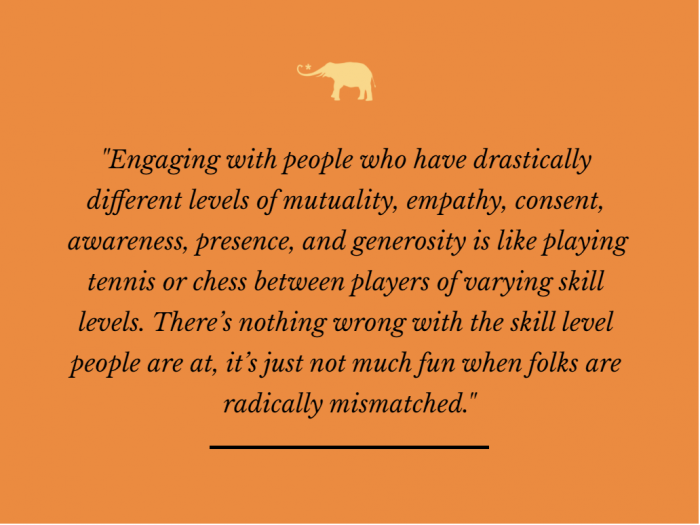View this post on Instagram
Historically, women and men entered into marriage largely as a practical financial arrangement.
Women because there was no other way to survive in the world other than finding a husband to provide for them, and men because they relied on the free labor of women to produce and care for their offspring and home.
Thankfully, for most of us, times have changed.
In this new era, we are more likely to seek mates for intimacy, friendship, companionship, and sexual expression. On the surface, these things—intimacy, friendship, and companionship—sound reasonable, attainable, and even virtuous. Yet in actual practice, these things are fairly sophisticated, mature, and complex forms of relating.
In the last year, I’ve been considering getting back in the dating world after a five-year hiatus. That process has included joining dating apps, considering eligible people in my social networks, and imagining what it would be like to engage intimately again.
Are we capable?
In observing the world of dating, I can’t help but wonder, pretty consistently, has our capacity and skill for the kind of relating we say we want caught up with our desires? Honestly, based on what I’ve seen, it seems like the answer is, “not so much.”
Defining relatedness.
If I’m asked to choose one word to represent what I’m looking for in a potential partner in order to attain the kind of intimacy and friendship I desire, it is definitely “relatedness.” In fact what I’m looking for in anyone whom I get close to, whether friend or client or colleague, is relatedness. From my perspective, relatedness can best be defined by some important sub-characteristics.
Here are a few of these sub-characteristics:
1. Mutuality.
Mutuality is the ability to share time and space equally. It’s an inclusive and curious conversation that flows with balance between people. It’s the ability to shift attention, awareness, and focus back and forth in considerate ways.
2. Empathy.
Empathy is the ability to experience another fully—to psychologically identify and understand someone else’s situation or feelings.
3. Consent.
To understand and practice consent at a deep level means to honor another for their moment-by-moment unfolding experience and adjust accordingly. To be so tuned into oneself and others that manipulation is nonexistent.
4. Self-awareness.
When we have examined ourselves, we become aware of our patterns, tendencies, habits, and shadows as well as how they may impact others. With this awareness, we are more able to navigate challenges and communicate more effectively.
5. Presence.
Showing up for interpersonal interactions as awake, sober, and present adults conveys that we are ready for engagement. This is presence.
6. Generosity.
Generosity is an attitude of openheartedness or an inclination and practice of giving of the self, sharing kindness, and a willingness to risk vulnerability.
Of course, this is not an exhaustive list. High-quality relating also requires honesty, integrity, and strong communication skills, among other things. But these are good places to start.
Aside from this set of skills, the other things people usually care about in dating are nearly irrelevant to me. Because for authentic intimacy and true friendship, physical attractiveness, level of physical athleticism, and financial status are all secondary traits. They may indicate fitness for reproducing or providing and protecting, but they convey almost nothing about one’s capacity for relating.
Setting a high bar.
I’ve been told by some that this definition of relatedness represents an unrealistic set of traits—a sort of high bar that’s unattainable in the average person.
My response to this is generally, “Who the heck are you hanging out with?”
Maybe because I live in a progressive town and have been in the counter culture movement all my life, I find myself surrounded by conscious women and (mostly gay) men who have invested in themselves and their relating skills enough to pull off this kind of engagement on the daily. I’m beyond grateful to be able to participate in these dynamic worlds with nearly everyone in my life.
But as I wade further into the dating world, I’m starting to realize that this set of skills and capacity may in fact be a higher bar than I had realized.
When relatedness fails.
Many of the women I know could put together an entire comedy skit of awkward first dates, characterized by a complete lack of these basic relatedness skills.
These include:
>> Lack of mutuality: dates who show up and talk about themselves the entire time without asking any questions about the other person.
>> Lack of empathy: dates who fail to respond at all when something personal is shared, or even worse, who change the subject.
>> Lack of consent: dates who get angry when sleeping together or when another date is taken off the table.
>> Lack of self-awareness: dates who have no idea why their last relationship failed or why the patterns in their lives are repeating themselves.
>> Lack of presence: dates who show up late, are distracted, or consistently look at their phones.
>> Lack of generosity: dates who appear contracted and afraid of life and people and who are waiting for others to offer them the healing they desire.
It’s not asking for too much.
With the following immense caveats—there are many ways of being in the world, being human is tender, and there isn’t a one-size-fits-all style of engagement—what’s going on here is an epidemic of emotional illiteracy and psychological immaturity.
It is not too much to ask, too elitist, too old-fashioned, or too emergent to expect these kinds of qualities in a potential mate. In fact, real intimacy, true friendship, and solid companionship require these exact traits.
My investment in developing these traits within myself has included decades of therapy, communication studies, a focus on self-care and authentic embodiment, practicing empathy and presence, and a strong desire toward compassion for the human condition. This journey has, for sure, required resources, but more importantly, it has required intention, dedication, and willingness.
Engaging with people who have drastically different levels of mutuality, empathy, consent, awareness, presence, and generosity is like playing tennis or chess between players of varying skill levels. There’s nothing wrong with the skill level people are at, it’s just not much fun when folks are radically mismatched.
Nonnegotiables.
Our culture has a long way to go if we’re looking to transform intimate relationships from ones that are based on financial necessity to ones that are based on relatedness.
At the very least, it would be helpful to collectively increase our emotional literacy through culture-wide education and support. And, at the very most, we could recognize and heal trauma, attachment disorders, and other forms of abuse and neglect that keep people from being fully resourced in their emotional and psychological lives.
Imagine the kinds of relating we could create by teaching self and other awareness, offering consent and presence training, and rewarding mutuality and empathy in all of our institutions.
Until that time, when our culture increases its sophistication and skill at relating, my dating life may be limited. Because high levels of relatedness are nonnegotiables for me.
As long as that remains my focus, I continue to experience rich and satisfying connections with those who share this capacity and skill. And that’s my definition of intimacy and friendship.











Read 11 comments and reply